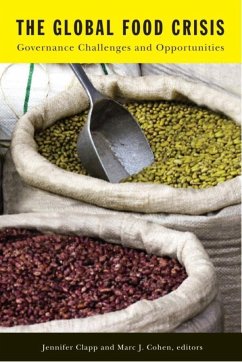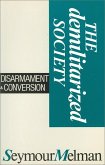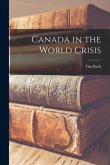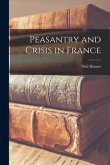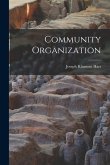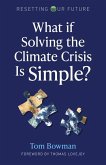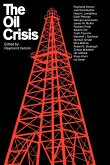The Global Food Crisis
Governance Challenges and Opportunities
Herausgeber: Clapp; Cohen, Marc J
The Global Food Crisis
Governance Challenges and Opportunities
Herausgeber: Clapp; Cohen, Marc J
- Broschiertes Buch
- Merkliste
- Auf die Merkliste
- Bewerten Bewerten
- Teilen
- Produkt teilen
- Produkterinnerung
- Produkterinnerung
The global food crisis is a stark reminder of the fragility of the global food system. The Global Food Crisis: Governance Challenges and Opportunities captures the debate about how to go forward and examines the implications of the crisis for food security in the world's poorest countries, both for the global environment and for the global rules and institutions that govern food and agriculture. In this volume, policy-makers and scholars assess the causes and consequences of the most recent food price volatility and examine the associated governance challenges and opportunities, including…mehr
Andere Kunden interessierten sich auch für
![The Demilitarized Society The Demilitarized Society]() Seymour MelmanThe Demilitarized Society16,99 €
Seymour MelmanThe Demilitarized Society16,99 €![Canada in the World Crisis Canada in the World Crisis]() Tim BuckCanada in the World Crisis16,99 €
Tim BuckCanada in the World Crisis16,99 €![Phoenix from the Ashes? Phoenix from the Ashes?]() Cameron Scott MitchellPhoenix from the Ashes?25,99 €
Cameron Scott MitchellPhoenix from the Ashes?25,99 €![Peasantry and Crisis in France Peasantry and Crisis in France]() Neil HunterPeasantry and Crisis in France25,99 €
Neil HunterPeasantry and Crisis in France25,99 €![Community Organization Community Organization]() Joseph Kinmont HartCommunity Organization23,99 €
Joseph Kinmont HartCommunity Organization23,99 €![What If Solving the Climate Crisis Is Simple? What If Solving the Climate Crisis Is Simple?]() Tom BowmanWhat If Solving the Climate Crisis Is Simple?10,99 €
Tom BowmanWhat If Solving the Climate Crisis Is Simple?10,99 €![The Oil Crisis The Oil Crisis]() The Oil Crisis25,99 €
The Oil Crisis25,99 €-
-
-
The global food crisis is a stark reminder of the fragility of the global food system. The Global Food Crisis: Governance Challenges and Opportunities captures the debate about how to go forward and examines the implications of the crisis for food security in the world's poorest countries, both for the global environment and for the global rules and institutions that govern food and agriculture. In this volume, policy-makers and scholars assess the causes and consequences of the most recent food price volatility and examine the associated governance challenges and opportunities, including short-term emergency responses, the ecological dimensions of the crisis, and the longer-term goal of building sustainable global food systems. The recommendations include vastly increasing public investment in small-farm agriculture; reforming global food aid and food research institutions; establishing fairer international agricultural trade rules; promoting sustainable agricultural methods; placing agriculture higher on the post-Kyoto climate change agenda; revamping biofuel policies; and enhancing international agricultural policy-making. Co-published with the Centre for International Governance Innovation
Hinweis: Dieser Artikel kann nur an eine deutsche Lieferadresse ausgeliefert werden.
Hinweis: Dieser Artikel kann nur an eine deutsche Lieferadresse ausgeliefert werden.
Produktdetails
- Produktdetails
- Verlag: Wilfrid Laurier University Press
- Seitenzahl: 288
- Erscheinungstermin: 30. September 2009
- Englisch
- Abmessung: 228mm x 151mm x 22mm
- Gewicht: 400g
- ISBN-13: 9781554581924
- ISBN-10: 1554581923
- Artikelnr.: 27011369
- Herstellerkennzeichnung
- Libri GmbH
- Europaallee 1
- 36244 Bad Hersfeld
- gpsr@libri.de
- Verlag: Wilfrid Laurier University Press
- Seitenzahl: 288
- Erscheinungstermin: 30. September 2009
- Englisch
- Abmessung: 228mm x 151mm x 22mm
- Gewicht: 400g
- ISBN-13: 9781554581924
- ISBN-10: 1554581923
- Artikelnr.: 27011369
- Herstellerkennzeichnung
- Libri GmbH
- Europaallee 1
- 36244 Bad Hersfeld
- gpsr@libri.de
Table of Contents for
The Global Food Crisis: Governance Challenges and Opportunities, edited by
Jennifer Clapp and Marc J. Cohen
List of Acronyms and Abbreviations
Introduction
1. The Food Crisis and Global Governance Jennifer Clapp and Marc J. Cohen
Part 1: The Causal Factors behind the Food Crisis
2. The Blame Game: Understanding Structural Causes of the Food Crisis
Anuradha Mittal
3. The 1974 and 2008 Food Price Crisis: Déjà-Vu? Sue Horton
4. Responding to Food Price Volatility and Vulnerability: Considering the
Global Economic Context Jennifer Clapp
5. US Biofuels Policy and the Global Food Price Crisis: A Survey of the
Issues Kimberly Ann Elliott
Part 2: Immediate Governance Challenges and Proposals: Food Aid, Trade
Measures, and International Grain Reserves
6. Responding to the 2008 "Food Crisis": Lessons from the Evolution of the
Food Aid Regime Raymond F. Hopkins
7. Preparing for an Uncertain Global Food Supply: A New Food Assistance
Convention C. Stuart Clark
8. From Food Handouts to Integrated Food Policies Frederic Mousseau
9: The Uses of Crisis: Progress on Implementing US Local/Regional
Procurement of Food Aid Gawain Kripke
Part 3: Longer-Term Ecological Concerns and Governance Responses
10. The Impact of Climate Change on Nutrition Cristina Tirado, Marc J.
Cohen, Noora-Lisa Aberman, and Brian Thompson
11. Fossil Energy and the Biophysical Roots of the Food Crisis Tony Weis
12. Setting the Global Dinner Table: Exploring the Limits of the
Marketization of Food Security Noah Zerbe
Part 4: Strategies to Promote Food Security and Sustainable Agriculture:
The Way Ahead
13. A Stronger Global Architecture for Food and Agriculture: Some Lessons
from FAO's History and Recent Evaluation Daniel J. Gustafson and John
Markie
14. Improving the Effectiveness of US Assistance in Transforming the Food
Security Outlook in Sub-Saharan Africa Emmy Simmons and Julie Howard
15. Urban Agriculture and Changing Food Markets Mark Redwood
16. Reorienting Local and Global Food Systems: Institutional Challenges and
Policy Options from the UN Agricultural Assessment Marcia Ishii-Eiteman
17. The Governance Challenges of Improving Global Food Security Alex
McCalla
Contributors
Noora-Lisa Aberman is a program analyst and communications specialist in
the Poverty, Health and Nutrition Division (formerly the Food Consumption
and Nutrition Division) of the International Food Policy Research Institute
in Washington, DC.
Jennifer Clapp is a CIGI Chair in International Governance and a professor
in the Faculty of Environmental Studies at the University of Waterloo. Her
recent books include Paths to a Green World: The Political Economy of the
Global Environment (co-authored with Peter Dauvergne, MIT Press, 2005) and
Corporate Power in Global Agri-Food Governance (co-edited with Doris Fuchs,
MIT Press, 2009). She is also co-editor of the journal Global Environmental
Politics (MIT Press).
Marc J. Cohen is a humanitarian policy researcher at Oxfam America in
Washington, DC and professorial lecturer in international development at
the Paul H. Nitze School of Advanced International Studies, Johns Hopkins
University. He previously was a research fellow in the Food Consumption and
Nutrition Division of the International Food Policy Research Institute
(IFPRI), and was the lead author of the 2008 IFPRI-FAO study Impact of
Climate Change and Bioenergy on Nutrition.
Kimberly Ann Elliott is a senior fellow with the Peterson Institute for
International Economics and the Center for Global Development. Her most
recent books include Delivering on Doha: Farm Trade and the Poor, which was
co-published by CGD and PIIE in 2006 and Economic Sanctions Reconsidered
(with Gary Hufbauer and Jeffrey Schott, 3rd. ed., 2007).
Daniel Gustafson is the director of the FAO Liaison Office for North
America. He has worked for the past thirty years on agricultural and rural
development in Latin America, Africa, and Asia as well as in the United
States. Previously, he was program director of the International
Development Management Center at the University of Maryland.
Raymond Hopkins has taught at Swarthmore College since 1967. He is the
author or co-author of six books and over sixty articles. He has been a
consultant to the State Department, the Food and Agriculture Organization
of the United Nations, the World Food Programme, the Agency for
International Development, the Canadian International Development
Association, the International Food Policy Research Institute, and the
World Bank.
Sue Horton is a professor of Economics at Wilfrid Laurier University. She
has worked in over twenty developing countries and has consulted for the
World Bank, the Asian Development Bank, several UN agencies, and the
International Development Research Centre. She served as the associate dean
of the Faculty of Arts and Science, chair of the Department of Social
Science and interim dean at the University of Toronto at Scarborough, and
as vice-president academic at Laurier.
Julie Howard is executive director of the Partnership to Cut Hunger and
Poverty in Africa, an independent nonprofit coalition dedicated to
increasing the level and effectiveness of US assistance and private
investment in Africa through research, dialogue, and advocacy. She also
serves as an adjunct assistant professor of development at Michigan State
University.
Marcia Ishii-Eitema is a senior scientist at Pesticide Action Network North
America and director of PANNA's Sustainable Solutions Program. She
previously directed PANNA's World Bank Accountability program and was a
lead author of the UN-led International Assessment of Agricultural
Knowledge, Science and Technology for Development (IAASTD). Prior to
joining PANNA in 1996, she worked in Asia and Africa facilitating
farmer-NGO collaborations on sustainable agriculture.
Gawain Kripke is the director of policy and research for Oxfam America,
based in Washington, DC. Prior to this position, he served as a senior
policy advisor on Oxfam's Make Trade Fair campaign. He is author of
numerous opinion pieces and briefing papers on trade and development
issues. Before to joining Oxfam, he served as director of economic programs
for the environmental organization Friends of the Earth.
John Markie is an independent consultant. Previously he held positions with
the United Nations Committee for the Promotion and Advancement of
Cooperatives (COPAC), the Food and Agriculture Organization of the United
Nations and the United Nations Evaluation Group.
Alex McCalla is professor emeritus of economics at the University of
California, Davis, where he served as dean of the College of Agricultural
and Environmental Sciences, associate director of the California
Agricultural Experiment Station, and founding dean of the Graduate School
of Management. He also directed the Agriculture and Natural Resources
Department at the World Bank, chaired the Technical Advisory Committee of
the Consultative Group on International Agricultural Research, and was a
founding member and co-convenor of the International Agricultural Trade
Research Consortium.
Anuradha Mittal is executive director of the Oakland Institute, a
progressive policy think-tank she founded in Oakland, California in 2004.
She is an expert on trade, development, human rights, and agriculture
issues. Mittal is the author and editor of numerous articles and books
including America Needs Human Rights and The Future in the Balance: Essays
on Globalization and Resistance. Previously, she was co-director of Food
First Institute for Food and Development Policy.
Frederic Mousseau is a senior fellow at the Oakland Institute and a food
security consultant who works with international relief agencies including
Action Against Hunger, Doctors Without Borders and Oxfam International. He
is author of Food Aid or Food Sovereignty? Ending World Hunger in Our Time
, and his work has involved the design of food security interventions in a
number of countries.
Mark Redwood is program leader of the Urban Poverty and Environment section
of the International Development Research Centre in Ottawa, Canada. He has
published numerous articles on wastewater use for agriculture and his most
recent book is Agriculture in Urban Planning: Generating Livelihood and
Food Security (IDRC 2008).
Emmy Simmons is an independent consultant on international development
issues. She is co-chair of the Roundtable on Science and Technology for
Sustainability at the U.S. National Academies of Science and leads a
Roundtable working group on Partnerships for Sustainability. Previously,
she had a long career and held a number of positions at the US Agency for
International Development (USAID), including assistant administrator for
Economic Growth, Agriculture and Trade.
Cristina Tirado is an independent consultant on environment, food, climate
change, and health policy issues for the UN, governmental, and
non-governmental international organizations and universities. She
participated in the first international European Commission/World Health
Organization (WHO) research project on Climate Change and Adaptation
Strategies for Human Health in Europe. She has also advised the Food and
Agriculture Organization of the United Nations and the International Food
Policy Research Institute.
Brian Thompson is a senior nutrition officer in the Nutrition and Consumer
Protection Division of the Food and Agriculture Organization of the United
Nations, based in Rome, Italy.
Tony Weis is an assistant professor in the Department of Geography at the
University of Western Ontario, Canada. He is author of The Global Food
Economy: The Battle for the Future of Farming (Zed Books, 2007) as well as
numerous articles on the global food system, agriculture and environment.
Noah Zerbe is an assistant professor of politics at Humboldt State
University, California. He is the author of Agricultural Biotechnology
Reconsidered: Western Narratives, African Alternatives (Africa World Press,
2004) as well asnumerous articles on the political economy of agricultural
biotechnology.
The Global Food Crisis: Governance Challenges and Opportunities, edited by
Jennifer Clapp and Marc J. Cohen
List of Acronyms and Abbreviations
Introduction
1. The Food Crisis and Global Governance Jennifer Clapp and Marc J. Cohen
Part 1: The Causal Factors behind the Food Crisis
2. The Blame Game: Understanding Structural Causes of the Food Crisis
Anuradha Mittal
3. The 1974 and 2008 Food Price Crisis: Déjà-Vu? Sue Horton
4. Responding to Food Price Volatility and Vulnerability: Considering the
Global Economic Context Jennifer Clapp
5. US Biofuels Policy and the Global Food Price Crisis: A Survey of the
Issues Kimberly Ann Elliott
Part 2: Immediate Governance Challenges and Proposals: Food Aid, Trade
Measures, and International Grain Reserves
6. Responding to the 2008 "Food Crisis": Lessons from the Evolution of the
Food Aid Regime Raymond F. Hopkins
7. Preparing for an Uncertain Global Food Supply: A New Food Assistance
Convention C. Stuart Clark
8. From Food Handouts to Integrated Food Policies Frederic Mousseau
9: The Uses of Crisis: Progress on Implementing US Local/Regional
Procurement of Food Aid Gawain Kripke
Part 3: Longer-Term Ecological Concerns and Governance Responses
10. The Impact of Climate Change on Nutrition Cristina Tirado, Marc J.
Cohen, Noora-Lisa Aberman, and Brian Thompson
11. Fossil Energy and the Biophysical Roots of the Food Crisis Tony Weis
12. Setting the Global Dinner Table: Exploring the Limits of the
Marketization of Food Security Noah Zerbe
Part 4: Strategies to Promote Food Security and Sustainable Agriculture:
The Way Ahead
13. A Stronger Global Architecture for Food and Agriculture: Some Lessons
from FAO's History and Recent Evaluation Daniel J. Gustafson and John
Markie
14. Improving the Effectiveness of US Assistance in Transforming the Food
Security Outlook in Sub-Saharan Africa Emmy Simmons and Julie Howard
15. Urban Agriculture and Changing Food Markets Mark Redwood
16. Reorienting Local and Global Food Systems: Institutional Challenges and
Policy Options from the UN Agricultural Assessment Marcia Ishii-Eiteman
17. The Governance Challenges of Improving Global Food Security Alex
McCalla
Contributors
Noora-Lisa Aberman is a program analyst and communications specialist in
the Poverty, Health and Nutrition Division (formerly the Food Consumption
and Nutrition Division) of the International Food Policy Research Institute
in Washington, DC.
Jennifer Clapp is a CIGI Chair in International Governance and a professor
in the Faculty of Environmental Studies at the University of Waterloo. Her
recent books include Paths to a Green World: The Political Economy of the
Global Environment (co-authored with Peter Dauvergne, MIT Press, 2005) and
Corporate Power in Global Agri-Food Governance (co-edited with Doris Fuchs,
MIT Press, 2009). She is also co-editor of the journal Global Environmental
Politics (MIT Press).
Marc J. Cohen is a humanitarian policy researcher at Oxfam America in
Washington, DC and professorial lecturer in international development at
the Paul H. Nitze School of Advanced International Studies, Johns Hopkins
University. He previously was a research fellow in the Food Consumption and
Nutrition Division of the International Food Policy Research Institute
(IFPRI), and was the lead author of the 2008 IFPRI-FAO study Impact of
Climate Change and Bioenergy on Nutrition.
Kimberly Ann Elliott is a senior fellow with the Peterson Institute for
International Economics and the Center for Global Development. Her most
recent books include Delivering on Doha: Farm Trade and the Poor, which was
co-published by CGD and PIIE in 2006 and Economic Sanctions Reconsidered
(with Gary Hufbauer and Jeffrey Schott, 3rd. ed., 2007).
Daniel Gustafson is the director of the FAO Liaison Office for North
America. He has worked for the past thirty years on agricultural and rural
development in Latin America, Africa, and Asia as well as in the United
States. Previously, he was program director of the International
Development Management Center at the University of Maryland.
Raymond Hopkins has taught at Swarthmore College since 1967. He is the
author or co-author of six books and over sixty articles. He has been a
consultant to the State Department, the Food and Agriculture Organization
of the United Nations, the World Food Programme, the Agency for
International Development, the Canadian International Development
Association, the International Food Policy Research Institute, and the
World Bank.
Sue Horton is a professor of Economics at Wilfrid Laurier University. She
has worked in over twenty developing countries and has consulted for the
World Bank, the Asian Development Bank, several UN agencies, and the
International Development Research Centre. She served as the associate dean
of the Faculty of Arts and Science, chair of the Department of Social
Science and interim dean at the University of Toronto at Scarborough, and
as vice-president academic at Laurier.
Julie Howard is executive director of the Partnership to Cut Hunger and
Poverty in Africa, an independent nonprofit coalition dedicated to
increasing the level and effectiveness of US assistance and private
investment in Africa through research, dialogue, and advocacy. She also
serves as an adjunct assistant professor of development at Michigan State
University.
Marcia Ishii-Eitema is a senior scientist at Pesticide Action Network North
America and director of PANNA's Sustainable Solutions Program. She
previously directed PANNA's World Bank Accountability program and was a
lead author of the UN-led International Assessment of Agricultural
Knowledge, Science and Technology for Development (IAASTD). Prior to
joining PANNA in 1996, she worked in Asia and Africa facilitating
farmer-NGO collaborations on sustainable agriculture.
Gawain Kripke is the director of policy and research for Oxfam America,
based in Washington, DC. Prior to this position, he served as a senior
policy advisor on Oxfam's Make Trade Fair campaign. He is author of
numerous opinion pieces and briefing papers on trade and development
issues. Before to joining Oxfam, he served as director of economic programs
for the environmental organization Friends of the Earth.
John Markie is an independent consultant. Previously he held positions with
the United Nations Committee for the Promotion and Advancement of
Cooperatives (COPAC), the Food and Agriculture Organization of the United
Nations and the United Nations Evaluation Group.
Alex McCalla is professor emeritus of economics at the University of
California, Davis, where he served as dean of the College of Agricultural
and Environmental Sciences, associate director of the California
Agricultural Experiment Station, and founding dean of the Graduate School
of Management. He also directed the Agriculture and Natural Resources
Department at the World Bank, chaired the Technical Advisory Committee of
the Consultative Group on International Agricultural Research, and was a
founding member and co-convenor of the International Agricultural Trade
Research Consortium.
Anuradha Mittal is executive director of the Oakland Institute, a
progressive policy think-tank she founded in Oakland, California in 2004.
She is an expert on trade, development, human rights, and agriculture
issues. Mittal is the author and editor of numerous articles and books
including America Needs Human Rights and The Future in the Balance: Essays
on Globalization and Resistance. Previously, she was co-director of Food
First Institute for Food and Development Policy.
Frederic Mousseau is a senior fellow at the Oakland Institute and a food
security consultant who works with international relief agencies including
Action Against Hunger, Doctors Without Borders and Oxfam International. He
is author of Food Aid or Food Sovereignty? Ending World Hunger in Our Time
, and his work has involved the design of food security interventions in a
number of countries.
Mark Redwood is program leader of the Urban Poverty and Environment section
of the International Development Research Centre in Ottawa, Canada. He has
published numerous articles on wastewater use for agriculture and his most
recent book is Agriculture in Urban Planning: Generating Livelihood and
Food Security (IDRC 2008).
Emmy Simmons is an independent consultant on international development
issues. She is co-chair of the Roundtable on Science and Technology for
Sustainability at the U.S. National Academies of Science and leads a
Roundtable working group on Partnerships for Sustainability. Previously,
she had a long career and held a number of positions at the US Agency for
International Development (USAID), including assistant administrator for
Economic Growth, Agriculture and Trade.
Cristina Tirado is an independent consultant on environment, food, climate
change, and health policy issues for the UN, governmental, and
non-governmental international organizations and universities. She
participated in the first international European Commission/World Health
Organization (WHO) research project on Climate Change and Adaptation
Strategies for Human Health in Europe. She has also advised the Food and
Agriculture Organization of the United Nations and the International Food
Policy Research Institute.
Brian Thompson is a senior nutrition officer in the Nutrition and Consumer
Protection Division of the Food and Agriculture Organization of the United
Nations, based in Rome, Italy.
Tony Weis is an assistant professor in the Department of Geography at the
University of Western Ontario, Canada. He is author of The Global Food
Economy: The Battle for the Future of Farming (Zed Books, 2007) as well as
numerous articles on the global food system, agriculture and environment.
Noah Zerbe is an assistant professor of politics at Humboldt State
University, California. He is the author of Agricultural Biotechnology
Reconsidered: Western Narratives, African Alternatives (Africa World Press,
2004) as well asnumerous articles on the political economy of agricultural
biotechnology.
Table of Contents for
The Global Food Crisis: Governance Challenges and Opportunities, edited by
Jennifer Clapp and Marc J. Cohen
List of Acronyms and Abbreviations
Introduction
1. The Food Crisis and Global Governance Jennifer Clapp and Marc J. Cohen
Part 1: The Causal Factors behind the Food Crisis
2. The Blame Game: Understanding Structural Causes of the Food Crisis
Anuradha Mittal
3. The 1974 and 2008 Food Price Crisis: Déjà-Vu? Sue Horton
4. Responding to Food Price Volatility and Vulnerability: Considering the
Global Economic Context Jennifer Clapp
5. US Biofuels Policy and the Global Food Price Crisis: A Survey of the
Issues Kimberly Ann Elliott
Part 2: Immediate Governance Challenges and Proposals: Food Aid, Trade
Measures, and International Grain Reserves
6. Responding to the 2008 "Food Crisis": Lessons from the Evolution of the
Food Aid Regime Raymond F. Hopkins
7. Preparing for an Uncertain Global Food Supply: A New Food Assistance
Convention C. Stuart Clark
8. From Food Handouts to Integrated Food Policies Frederic Mousseau
9: The Uses of Crisis: Progress on Implementing US Local/Regional
Procurement of Food Aid Gawain Kripke
Part 3: Longer-Term Ecological Concerns and Governance Responses
10. The Impact of Climate Change on Nutrition Cristina Tirado, Marc J.
Cohen, Noora-Lisa Aberman, and Brian Thompson
11. Fossil Energy and the Biophysical Roots of the Food Crisis Tony Weis
12. Setting the Global Dinner Table: Exploring the Limits of the
Marketization of Food Security Noah Zerbe
Part 4: Strategies to Promote Food Security and Sustainable Agriculture:
The Way Ahead
13. A Stronger Global Architecture for Food and Agriculture: Some Lessons
from FAO's History and Recent Evaluation Daniel J. Gustafson and John
Markie
14. Improving the Effectiveness of US Assistance in Transforming the Food
Security Outlook in Sub-Saharan Africa Emmy Simmons and Julie Howard
15. Urban Agriculture and Changing Food Markets Mark Redwood
16. Reorienting Local and Global Food Systems: Institutional Challenges and
Policy Options from the UN Agricultural Assessment Marcia Ishii-Eiteman
17. The Governance Challenges of Improving Global Food Security Alex
McCalla
Contributors
Noora-Lisa Aberman is a program analyst and communications specialist in
the Poverty, Health and Nutrition Division (formerly the Food Consumption
and Nutrition Division) of the International Food Policy Research Institute
in Washington, DC.
Jennifer Clapp is a CIGI Chair in International Governance and a professor
in the Faculty of Environmental Studies at the University of Waterloo. Her
recent books include Paths to a Green World: The Political Economy of the
Global Environment (co-authored with Peter Dauvergne, MIT Press, 2005) and
Corporate Power in Global Agri-Food Governance (co-edited with Doris Fuchs,
MIT Press, 2009). She is also co-editor of the journal Global Environmental
Politics (MIT Press).
Marc J. Cohen is a humanitarian policy researcher at Oxfam America in
Washington, DC and professorial lecturer in international development at
the Paul H. Nitze School of Advanced International Studies, Johns Hopkins
University. He previously was a research fellow in the Food Consumption and
Nutrition Division of the International Food Policy Research Institute
(IFPRI), and was the lead author of the 2008 IFPRI-FAO study Impact of
Climate Change and Bioenergy on Nutrition.
Kimberly Ann Elliott is a senior fellow with the Peterson Institute for
International Economics and the Center for Global Development. Her most
recent books include Delivering on Doha: Farm Trade and the Poor, which was
co-published by CGD and PIIE in 2006 and Economic Sanctions Reconsidered
(with Gary Hufbauer and Jeffrey Schott, 3rd. ed., 2007).
Daniel Gustafson is the director of the FAO Liaison Office for North
America. He has worked for the past thirty years on agricultural and rural
development in Latin America, Africa, and Asia as well as in the United
States. Previously, he was program director of the International
Development Management Center at the University of Maryland.
Raymond Hopkins has taught at Swarthmore College since 1967. He is the
author or co-author of six books and over sixty articles. He has been a
consultant to the State Department, the Food and Agriculture Organization
of the United Nations, the World Food Programme, the Agency for
International Development, the Canadian International Development
Association, the International Food Policy Research Institute, and the
World Bank.
Sue Horton is a professor of Economics at Wilfrid Laurier University. She
has worked in over twenty developing countries and has consulted for the
World Bank, the Asian Development Bank, several UN agencies, and the
International Development Research Centre. She served as the associate dean
of the Faculty of Arts and Science, chair of the Department of Social
Science and interim dean at the University of Toronto at Scarborough, and
as vice-president academic at Laurier.
Julie Howard is executive director of the Partnership to Cut Hunger and
Poverty in Africa, an independent nonprofit coalition dedicated to
increasing the level and effectiveness of US assistance and private
investment in Africa through research, dialogue, and advocacy. She also
serves as an adjunct assistant professor of development at Michigan State
University.
Marcia Ishii-Eitema is a senior scientist at Pesticide Action Network North
America and director of PANNA's Sustainable Solutions Program. She
previously directed PANNA's World Bank Accountability program and was a
lead author of the UN-led International Assessment of Agricultural
Knowledge, Science and Technology for Development (IAASTD). Prior to
joining PANNA in 1996, she worked in Asia and Africa facilitating
farmer-NGO collaborations on sustainable agriculture.
Gawain Kripke is the director of policy and research for Oxfam America,
based in Washington, DC. Prior to this position, he served as a senior
policy advisor on Oxfam's Make Trade Fair campaign. He is author of
numerous opinion pieces and briefing papers on trade and development
issues. Before to joining Oxfam, he served as director of economic programs
for the environmental organization Friends of the Earth.
John Markie is an independent consultant. Previously he held positions with
the United Nations Committee for the Promotion and Advancement of
Cooperatives (COPAC), the Food and Agriculture Organization of the United
Nations and the United Nations Evaluation Group.
Alex McCalla is professor emeritus of economics at the University of
California, Davis, where he served as dean of the College of Agricultural
and Environmental Sciences, associate director of the California
Agricultural Experiment Station, and founding dean of the Graduate School
of Management. He also directed the Agriculture and Natural Resources
Department at the World Bank, chaired the Technical Advisory Committee of
the Consultative Group on International Agricultural Research, and was a
founding member and co-convenor of the International Agricultural Trade
Research Consortium.
Anuradha Mittal is executive director of the Oakland Institute, a
progressive policy think-tank she founded in Oakland, California in 2004.
She is an expert on trade, development, human rights, and agriculture
issues. Mittal is the author and editor of numerous articles and books
including America Needs Human Rights and The Future in the Balance: Essays
on Globalization and Resistance. Previously, she was co-director of Food
First Institute for Food and Development Policy.
Frederic Mousseau is a senior fellow at the Oakland Institute and a food
security consultant who works with international relief agencies including
Action Against Hunger, Doctors Without Borders and Oxfam International. He
is author of Food Aid or Food Sovereignty? Ending World Hunger in Our Time
, and his work has involved the design of food security interventions in a
number of countries.
Mark Redwood is program leader of the Urban Poverty and Environment section
of the International Development Research Centre in Ottawa, Canada. He has
published numerous articles on wastewater use for agriculture and his most
recent book is Agriculture in Urban Planning: Generating Livelihood and
Food Security (IDRC 2008).
Emmy Simmons is an independent consultant on international development
issues. She is co-chair of the Roundtable on Science and Technology for
Sustainability at the U.S. National Academies of Science and leads a
Roundtable working group on Partnerships for Sustainability. Previously,
she had a long career and held a number of positions at the US Agency for
International Development (USAID), including assistant administrator for
Economic Growth, Agriculture and Trade.
Cristina Tirado is an independent consultant on environment, food, climate
change, and health policy issues for the UN, governmental, and
non-governmental international organizations and universities. She
participated in the first international European Commission/World Health
Organization (WHO) research project on Climate Change and Adaptation
Strategies for Human Health in Europe. She has also advised the Food and
Agriculture Organization of the United Nations and the International Food
Policy Research Institute.
Brian Thompson is a senior nutrition officer in the Nutrition and Consumer
Protection Division of the Food and Agriculture Organization of the United
Nations, based in Rome, Italy.
Tony Weis is an assistant professor in the Department of Geography at the
University of Western Ontario, Canada. He is author of The Global Food
Economy: The Battle for the Future of Farming (Zed Books, 2007) as well as
numerous articles on the global food system, agriculture and environment.
Noah Zerbe is an assistant professor of politics at Humboldt State
University, California. He is the author of Agricultural Biotechnology
Reconsidered: Western Narratives, African Alternatives (Africa World Press,
2004) as well asnumerous articles on the political economy of agricultural
biotechnology.
The Global Food Crisis: Governance Challenges and Opportunities, edited by
Jennifer Clapp and Marc J. Cohen
List of Acronyms and Abbreviations
Introduction
1. The Food Crisis and Global Governance Jennifer Clapp and Marc J. Cohen
Part 1: The Causal Factors behind the Food Crisis
2. The Blame Game: Understanding Structural Causes of the Food Crisis
Anuradha Mittal
3. The 1974 and 2008 Food Price Crisis: Déjà-Vu? Sue Horton
4. Responding to Food Price Volatility and Vulnerability: Considering the
Global Economic Context Jennifer Clapp
5. US Biofuels Policy and the Global Food Price Crisis: A Survey of the
Issues Kimberly Ann Elliott
Part 2: Immediate Governance Challenges and Proposals: Food Aid, Trade
Measures, and International Grain Reserves
6. Responding to the 2008 "Food Crisis": Lessons from the Evolution of the
Food Aid Regime Raymond F. Hopkins
7. Preparing for an Uncertain Global Food Supply: A New Food Assistance
Convention C. Stuart Clark
8. From Food Handouts to Integrated Food Policies Frederic Mousseau
9: The Uses of Crisis: Progress on Implementing US Local/Regional
Procurement of Food Aid Gawain Kripke
Part 3: Longer-Term Ecological Concerns and Governance Responses
10. The Impact of Climate Change on Nutrition Cristina Tirado, Marc J.
Cohen, Noora-Lisa Aberman, and Brian Thompson
11. Fossil Energy and the Biophysical Roots of the Food Crisis Tony Weis
12. Setting the Global Dinner Table: Exploring the Limits of the
Marketization of Food Security Noah Zerbe
Part 4: Strategies to Promote Food Security and Sustainable Agriculture:
The Way Ahead
13. A Stronger Global Architecture for Food and Agriculture: Some Lessons
from FAO's History and Recent Evaluation Daniel J. Gustafson and John
Markie
14. Improving the Effectiveness of US Assistance in Transforming the Food
Security Outlook in Sub-Saharan Africa Emmy Simmons and Julie Howard
15. Urban Agriculture and Changing Food Markets Mark Redwood
16. Reorienting Local and Global Food Systems: Institutional Challenges and
Policy Options from the UN Agricultural Assessment Marcia Ishii-Eiteman
17. The Governance Challenges of Improving Global Food Security Alex
McCalla
Contributors
Noora-Lisa Aberman is a program analyst and communications specialist in
the Poverty, Health and Nutrition Division (formerly the Food Consumption
and Nutrition Division) of the International Food Policy Research Institute
in Washington, DC.
Jennifer Clapp is a CIGI Chair in International Governance and a professor
in the Faculty of Environmental Studies at the University of Waterloo. Her
recent books include Paths to a Green World: The Political Economy of the
Global Environment (co-authored with Peter Dauvergne, MIT Press, 2005) and
Corporate Power in Global Agri-Food Governance (co-edited with Doris Fuchs,
MIT Press, 2009). She is also co-editor of the journal Global Environmental
Politics (MIT Press).
Marc J. Cohen is a humanitarian policy researcher at Oxfam America in
Washington, DC and professorial lecturer in international development at
the Paul H. Nitze School of Advanced International Studies, Johns Hopkins
University. He previously was a research fellow in the Food Consumption and
Nutrition Division of the International Food Policy Research Institute
(IFPRI), and was the lead author of the 2008 IFPRI-FAO study Impact of
Climate Change and Bioenergy on Nutrition.
Kimberly Ann Elliott is a senior fellow with the Peterson Institute for
International Economics and the Center for Global Development. Her most
recent books include Delivering on Doha: Farm Trade and the Poor, which was
co-published by CGD and PIIE in 2006 and Economic Sanctions Reconsidered
(with Gary Hufbauer and Jeffrey Schott, 3rd. ed., 2007).
Daniel Gustafson is the director of the FAO Liaison Office for North
America. He has worked for the past thirty years on agricultural and rural
development in Latin America, Africa, and Asia as well as in the United
States. Previously, he was program director of the International
Development Management Center at the University of Maryland.
Raymond Hopkins has taught at Swarthmore College since 1967. He is the
author or co-author of six books and over sixty articles. He has been a
consultant to the State Department, the Food and Agriculture Organization
of the United Nations, the World Food Programme, the Agency for
International Development, the Canadian International Development
Association, the International Food Policy Research Institute, and the
World Bank.
Sue Horton is a professor of Economics at Wilfrid Laurier University. She
has worked in over twenty developing countries and has consulted for the
World Bank, the Asian Development Bank, several UN agencies, and the
International Development Research Centre. She served as the associate dean
of the Faculty of Arts and Science, chair of the Department of Social
Science and interim dean at the University of Toronto at Scarborough, and
as vice-president academic at Laurier.
Julie Howard is executive director of the Partnership to Cut Hunger and
Poverty in Africa, an independent nonprofit coalition dedicated to
increasing the level and effectiveness of US assistance and private
investment in Africa through research, dialogue, and advocacy. She also
serves as an adjunct assistant professor of development at Michigan State
University.
Marcia Ishii-Eitema is a senior scientist at Pesticide Action Network North
America and director of PANNA's Sustainable Solutions Program. She
previously directed PANNA's World Bank Accountability program and was a
lead author of the UN-led International Assessment of Agricultural
Knowledge, Science and Technology for Development (IAASTD). Prior to
joining PANNA in 1996, she worked in Asia and Africa facilitating
farmer-NGO collaborations on sustainable agriculture.
Gawain Kripke is the director of policy and research for Oxfam America,
based in Washington, DC. Prior to this position, he served as a senior
policy advisor on Oxfam's Make Trade Fair campaign. He is author of
numerous opinion pieces and briefing papers on trade and development
issues. Before to joining Oxfam, he served as director of economic programs
for the environmental organization Friends of the Earth.
John Markie is an independent consultant. Previously he held positions with
the United Nations Committee for the Promotion and Advancement of
Cooperatives (COPAC), the Food and Agriculture Organization of the United
Nations and the United Nations Evaluation Group.
Alex McCalla is professor emeritus of economics at the University of
California, Davis, where he served as dean of the College of Agricultural
and Environmental Sciences, associate director of the California
Agricultural Experiment Station, and founding dean of the Graduate School
of Management. He also directed the Agriculture and Natural Resources
Department at the World Bank, chaired the Technical Advisory Committee of
the Consultative Group on International Agricultural Research, and was a
founding member and co-convenor of the International Agricultural Trade
Research Consortium.
Anuradha Mittal is executive director of the Oakland Institute, a
progressive policy think-tank she founded in Oakland, California in 2004.
She is an expert on trade, development, human rights, and agriculture
issues. Mittal is the author and editor of numerous articles and books
including America Needs Human Rights and The Future in the Balance: Essays
on Globalization and Resistance. Previously, she was co-director of Food
First Institute for Food and Development Policy.
Frederic Mousseau is a senior fellow at the Oakland Institute and a food
security consultant who works with international relief agencies including
Action Against Hunger, Doctors Without Borders and Oxfam International. He
is author of Food Aid or Food Sovereignty? Ending World Hunger in Our Time
, and his work has involved the design of food security interventions in a
number of countries.
Mark Redwood is program leader of the Urban Poverty and Environment section
of the International Development Research Centre in Ottawa, Canada. He has
published numerous articles on wastewater use for agriculture and his most
recent book is Agriculture in Urban Planning: Generating Livelihood and
Food Security (IDRC 2008).
Emmy Simmons is an independent consultant on international development
issues. She is co-chair of the Roundtable on Science and Technology for
Sustainability at the U.S. National Academies of Science and leads a
Roundtable working group on Partnerships for Sustainability. Previously,
she had a long career and held a number of positions at the US Agency for
International Development (USAID), including assistant administrator for
Economic Growth, Agriculture and Trade.
Cristina Tirado is an independent consultant on environment, food, climate
change, and health policy issues for the UN, governmental, and
non-governmental international organizations and universities. She
participated in the first international European Commission/World Health
Organization (WHO) research project on Climate Change and Adaptation
Strategies for Human Health in Europe. She has also advised the Food and
Agriculture Organization of the United Nations and the International Food
Policy Research Institute.
Brian Thompson is a senior nutrition officer in the Nutrition and Consumer
Protection Division of the Food and Agriculture Organization of the United
Nations, based in Rome, Italy.
Tony Weis is an assistant professor in the Department of Geography at the
University of Western Ontario, Canada. He is author of The Global Food
Economy: The Battle for the Future of Farming (Zed Books, 2007) as well as
numerous articles on the global food system, agriculture and environment.
Noah Zerbe is an assistant professor of politics at Humboldt State
University, California. He is the author of Agricultural Biotechnology
Reconsidered: Western Narratives, African Alternatives (Africa World Press,
2004) as well asnumerous articles on the political economy of agricultural
biotechnology.

